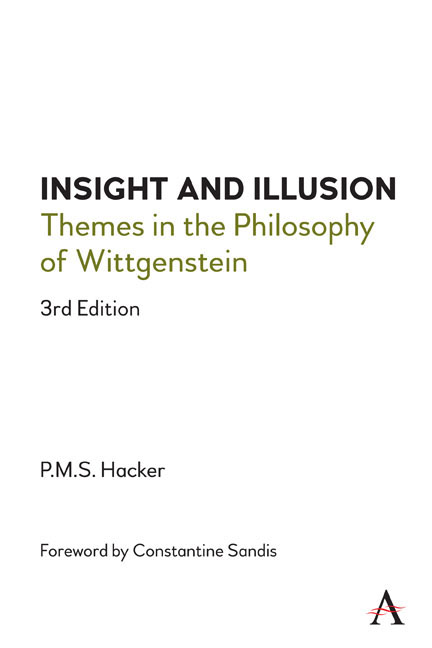Book contents
- Frontmatter
- Dedication
- Contents
- FOREWORD
- PREFACE TO THE REVISED EDITION
- PREFACE TO THE FIRST EDITION
- LIST OF ABBREVIATIONS
- I WITTGENSTEIN’S EARLY CONCEPTION OF PHILOSOPHY
- II THE DIALOGUE WITH FREGE AND RUSSELL
- III MEANING, METAPHYSICS, AND THE MIND
- IV EMPIRICAL REALISM AND TRANSCENDENTAL SOLIPSISM
- V DISINTEGRATION AND RECONSTRUCTION
- VI WITTGENSTEIN’S LATER CONCEPTION OF PHILOSOPHY
- VII METAPHYSICS AS THE SHADOW OF GRAMMAR
- VIII THE REFUTATION OF SOLIPSISM
- IX PRIVATE LINGUISTS AND PUBLIC SPEAKERS
- X ‘A CLOUD OF PHILOSOPHY CONDENSED INTO A DROP OF GRAMMAR’
- XI CRITERIA, REALISM AND ANTI-REALISM
- INDEX
VII - METAPHYSICS AS THE SHADOW OF GRAMMAR
Published online by Cambridge University Press: 24 February 2022
- Frontmatter
- Dedication
- Contents
- FOREWORD
- PREFACE TO THE REVISED EDITION
- PREFACE TO THE FIRST EDITION
- LIST OF ABBREVIATIONS
- I WITTGENSTEIN’S EARLY CONCEPTION OF PHILOSOPHY
- II THE DIALOGUE WITH FREGE AND RUSSELL
- III MEANING, METAPHYSICS, AND THE MIND
- IV EMPIRICAL REALISM AND TRANSCENDENTAL SOLIPSISM
- V DISINTEGRATION AND RECONSTRUCTION
- VI WITTGENSTEIN’S LATER CONCEPTION OF PHILOSOPHY
- VII METAPHYSICS AS THE SHADOW OF GRAMMAR
- VIII THE REFUTATION OF SOLIPSISM
- IX PRIVATE LINGUISTS AND PUBLIC SPEAKERS
- X ‘A CLOUD OF PHILOSOPHY CONDENSED INTO A DROP OF GRAMMAR’
- XI CRITERIA, REALISM AND ANTI-REALISM
- INDEX
Summary
Grammar
By contrast with the philosophical ideals of the youthful Wittgenstein, the viewpoint of the mature Wittgenstein may well seem tarnished and disillusioned. The dramatic change in his conception of the relation between language and reality, of the structures of language, and of the logical structures of the world, led to a re-allocation of the metaphysical from the domain of ineffability, where it lay protected by a penumbra of necessary silence, to the domain of philosophical illusion, a fit subject for the pathology of the intellect. This seems a picture of philosophy fallen from grace. Our understanding of this transformation can be furthered by exploring Wittgenstein's later conception of grammar and its relation to reality. Although the change runs deep, it is instructive to view it in certain respects as a matter of rotating the axis of the investigation one hundred and eighty degrees around the fixed point of our real need (PI,§108). In the Tractatusthe essence of language or thought provided the insight into the structure of reality. In the Investigationsthe essence of language is still, in a qualified sense, the subject of investigation (PI §92). Moreover it might still be said to be isomorphic with the ‘structure of reality’ (for the proposition that P does indeed correspond to the fact that P, if it is true), not because language must mirror the logical form of the universe, but because the apparent ‘structure of reality’ is merely the shadow cast by grammar.
It is illuminating to juxtapose Wittgenstein's conception of grammar with his earlier conception of logical syntax. According to the Tractatusthe surface grammars of ordinary languages may differ, but this conceals an underlying uniformity that is made manifest by logical analysis. Analysis will bring to view the essential rules of any possible language in virtue of which a symbolism can represent reality. Logical syntax is a system of rules for the use of signs. These rules are of various kinds. There are rules for the combination of propositions by means of truth-functional operators. Different kinds of rules, viz. definitions of names of complexes, introduce abbreviatory symbols. Yet other rules stipulate combinatorial possibilities for simple signs of various kinds.
- Type
- Chapter
- Information
- Insight and IllusionThemes in the Philosophy of Wittgenstein, pp. 179 - 214Publisher: Anthem PressPrint publication year: 2021

